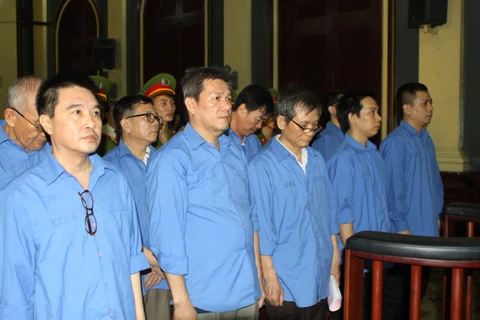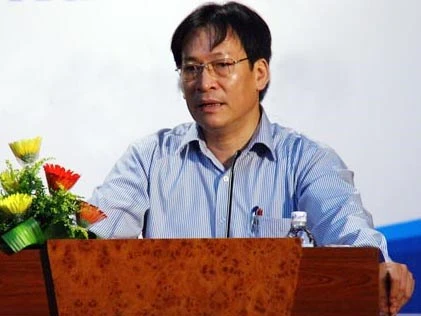 A trial on a corruption case which involves a branch manager of State-owned Agribank in Ho Chi Minh City (Source: VNA)
A trial on a corruption case which involves a branch manager of State-owned Agribank in Ho Chi Minh City (Source: VNA) Hanoi (VNA) – The Political Bureau has issued a directive on enhancing the leadership of the Party over the detection and settlement of corruption cases.
Under Directive No. 50-CT/TW, whose issuance was recently inked by Politburo member and permanent member of the Party Central Committee’s Secretariat Le Hong Anh, leaders of all-level Party committees and organisations, State agencies and units are required to set examples in the fight against corruption.
It is a must for them to show the highest responsibility for instructing the fight and take the initiative in tracing hints of corruption in their organisations, agencies, units and localities, the Directive said.
Those who turn a blind eye to corruption acts in their units should be strictly punished, according to the document.
The Directive also urged efforts in completing the legal system on anti-corruption, which, it said, should cling on the country’s reality and comply with relevant international treaties to which Vietnam is a member.
Corruption acts must be consistently stipulated in the Criminal Code, the Law on Anti-corruption and other relevant legal documents.
The Political Bureau asked for amending and supplementing laws on inspection and auditing to clarify competences and responsibilities of each agency in the fight.
In order to improve the efficiency of the work, the Political Bureau also appealed for enhanced inspection, auditing, investigation and control of public servants’ assets.
The Directive said the National Assembly and People’s Councils at all levels must be more responsible for uncovering and settling corruption cases.
At the same time, social responsibility, especially of the Vietnam Fatherland Front Central Committee and its member organisations, people’s inspection boards and mass media, should be further promoted during the fight.
The public is encouraged to join the combat and outstanding individuals should be honoured, the Directive said.
The investigation and settlement of corruption cases must be conducted in a prompt and fair manner in line with the law, the Political Bureau said, urging the leaders to select key cases which can teach them a lesson in the struggle.
The document also highlighted the retrieval of corrupted assets and the strict punishment of officials hindering the work.
In the Directive, the Political Bureau urged efforts to revamp the operation of advisors to the Party Committees and organisations, agencies and units in charge of fighting corruption.
The Central Anti-corruption Steering Committee and the Home Affairs Committees at the central, provincial and municipal levels are requested to organise conferences to review their anti-corruption performance and seek adjustments for the work.
The fight requires close coordination between competent agencies, organisations and units, as well as collaboration with foreign countries and international organisations to swiftly bring corruption cases to light, according to the Directive.
Besides, Vietnam will take the initiative in negotiating and signing judicial assistance agreements, and realising the UN Convention against Corruption in accordance with the set roadmap and the country’s legal system.
Additionally, communication work should be increased to draw the widespread participation of the public in the fight.
The Central Home Affairs Committee is tasked with teaming up with relevant agencies and organisations to supervise the implementation of the Directive and make regular reports to the Political Bureau and the Central Anti-corruption Steering Committee.
The Directive was born as corruption in the country still remains complicated. A few cases of corruption has been brought to light, the handling of several cases have prolonged and failed to reflect seriousness, and the recovery of corrupted assets was inefficient, sparking concerns and reservations in society.-VNA























